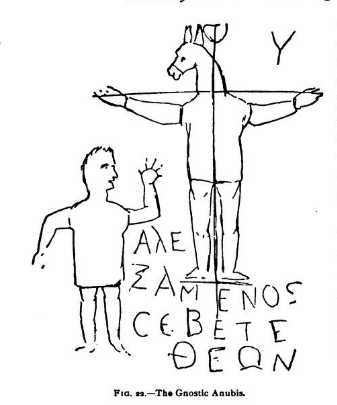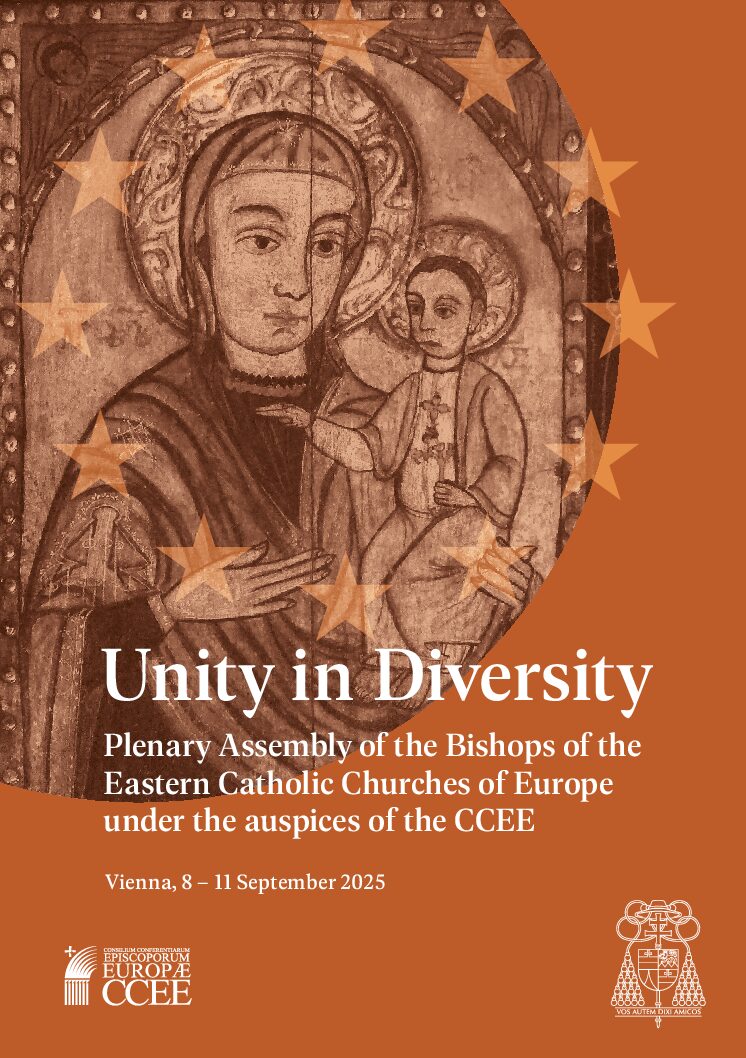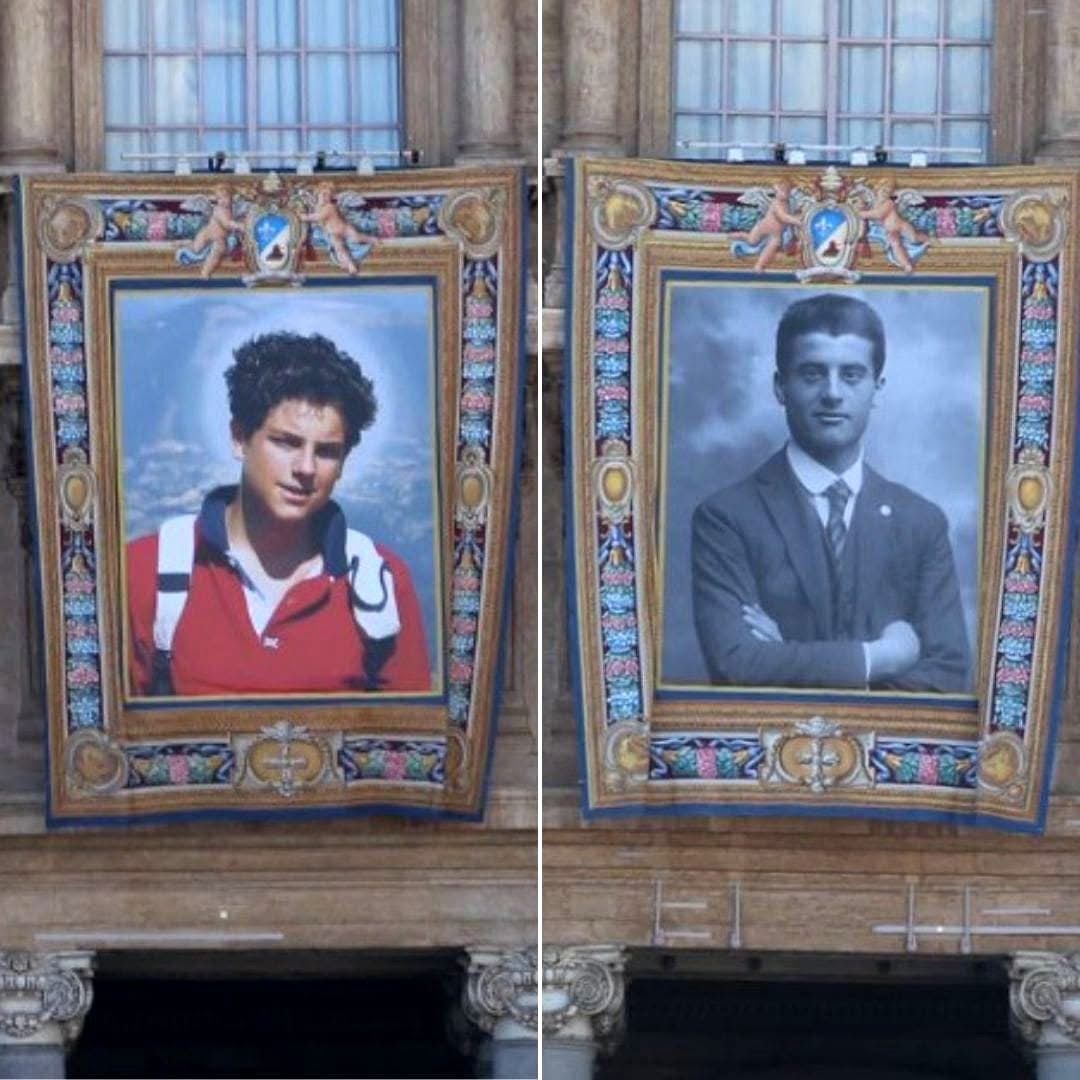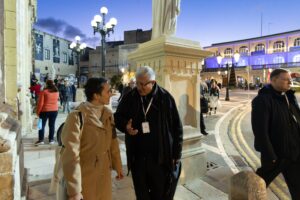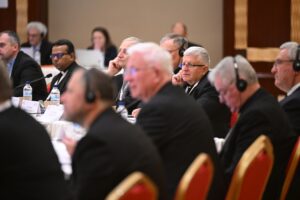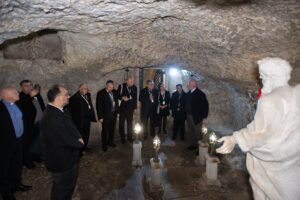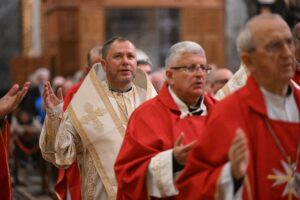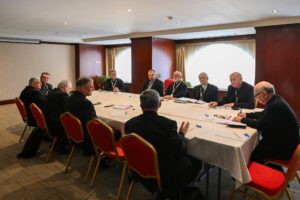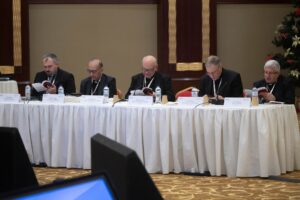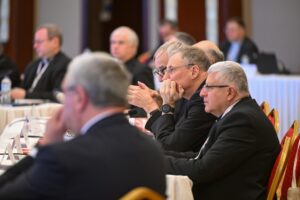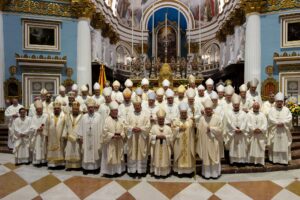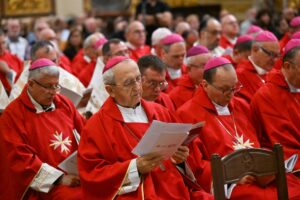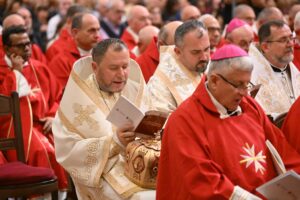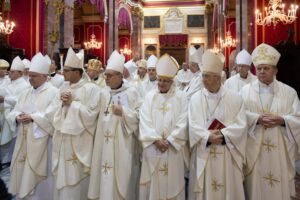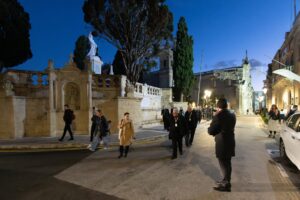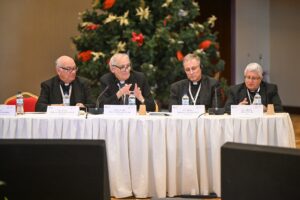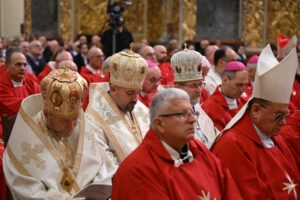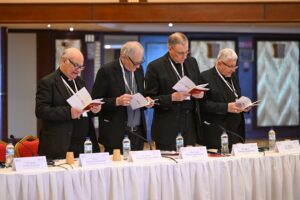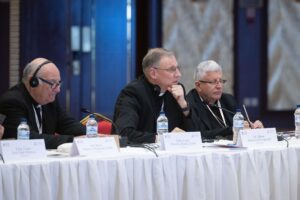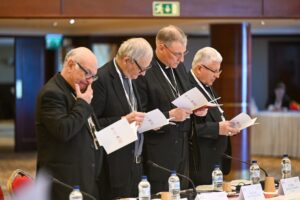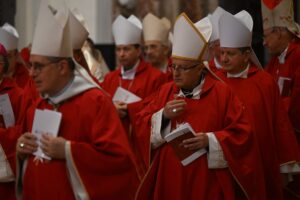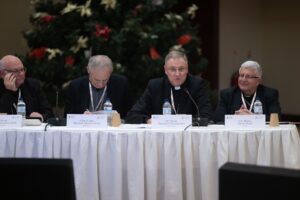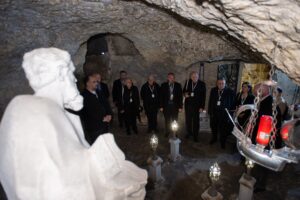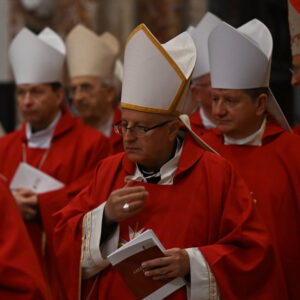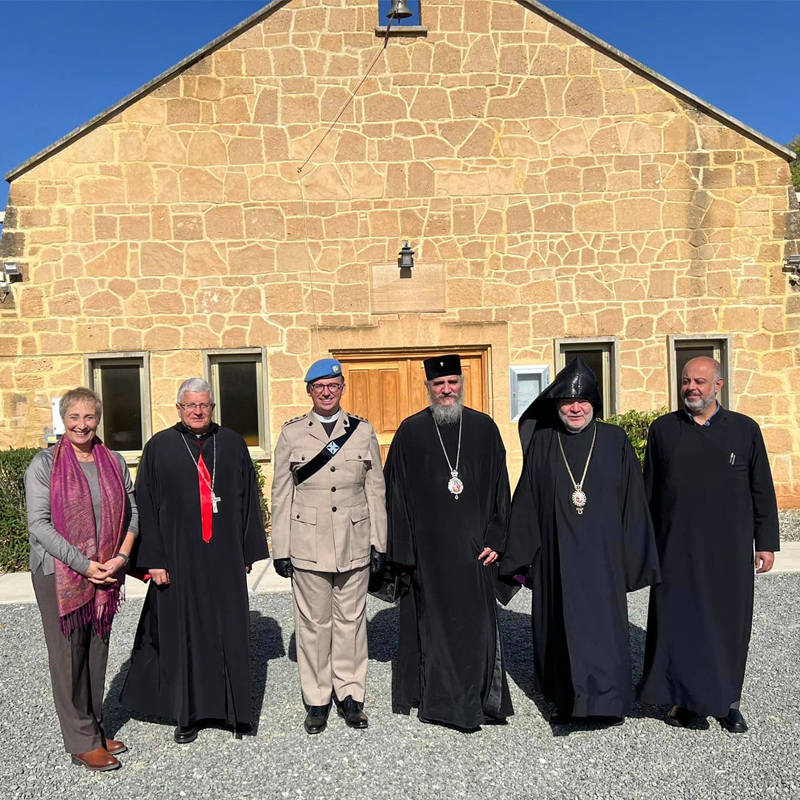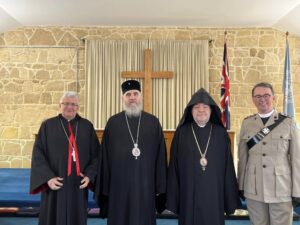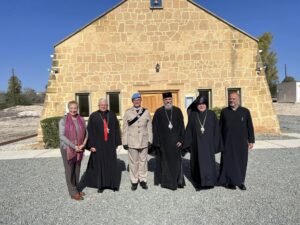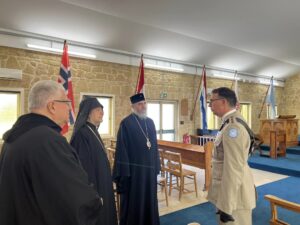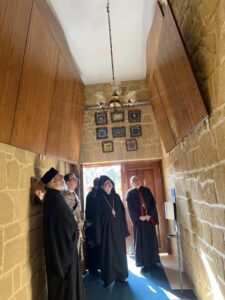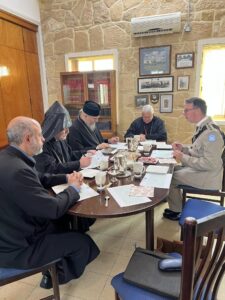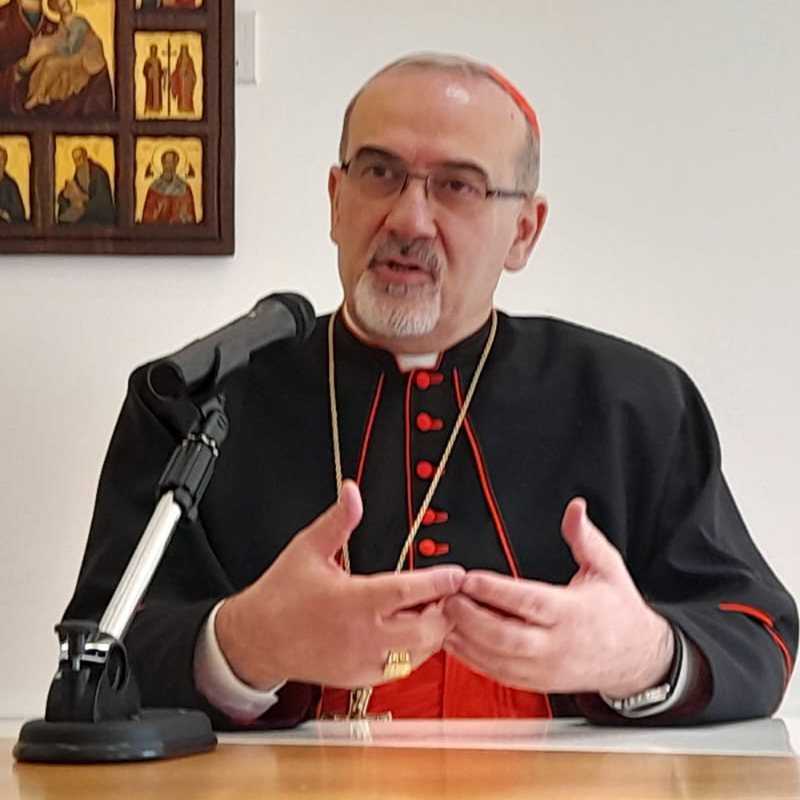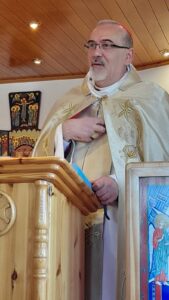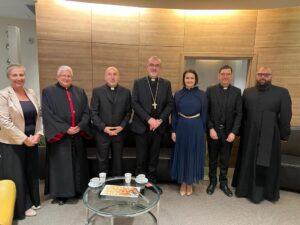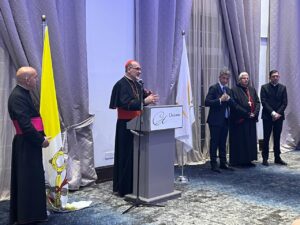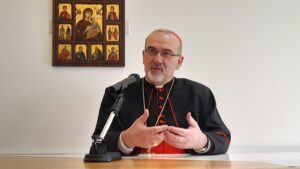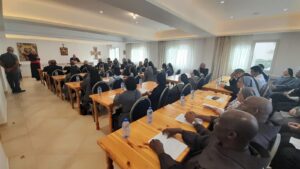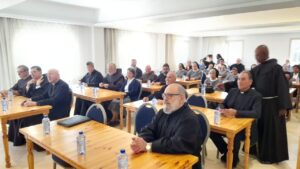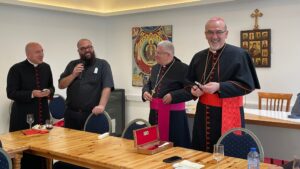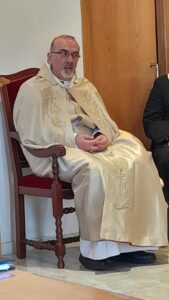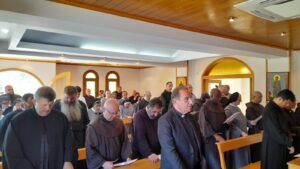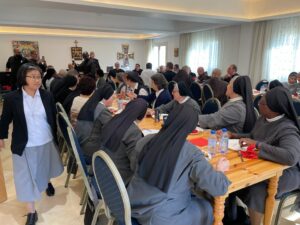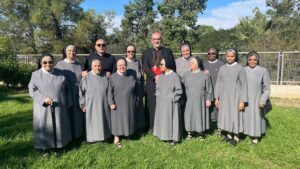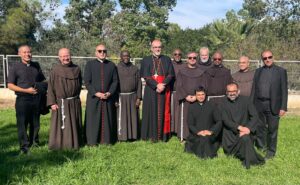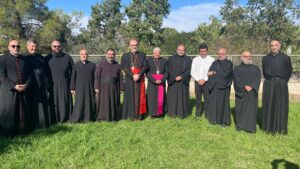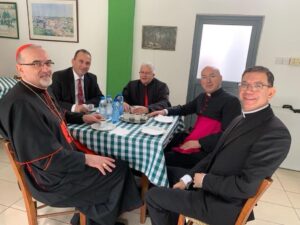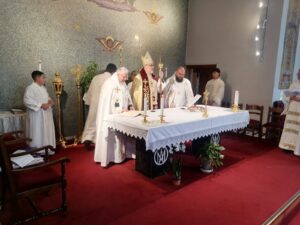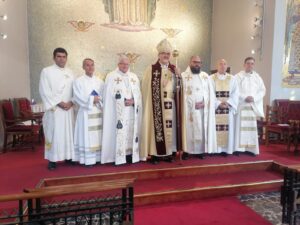Η περίοδος των Χριστουγέννων
Ομιλία του Σεβασμιωτάτου Αρχιεπισκόπου Μαρωνιτών
Κύπρου κ. Σελίμ Σφέιρ
3η Κυριακή της Περιόδου Της Παρουσίας
Ο Ευαγγελισμός του Ζαχαρία
Λουκάς 1, 1-25
Πολλοί προσπάθησαν να συντάξουν μια διήγηση για
τα γεγονότα, που είναι βεβαιωμένο ότι συνέβησαν
ανάμεσά μας, όπως μας τα παρέδωσαν εκείνοι που από την
αρχή ήταν αυτόπτες μάρτυρες και έγιναν κήρυκες αυτού
του χαρμόσυνου μηνύματος. Γι' αυτό θεώρησα κι εγώ
καλό, εντιμότατε Θεόφιλε, αφού ερεύνησα όλα τα
γεγονότα από την αρχή και με ακρίβεια, να σου τα γράψω
με τη σειρά, για να βεβαιωθείς ότι τα όσα διδάχθηκες είναι
αυθεντικά.
Την εποχή που βασιλιάς στην Ιουδαία ήταν ο Ηρώδης,
ζούσε κάποιος ιερέας από την ιερατική τάξη του Άβιά, που
τον έλεγαν Ζαχαρία η γυναίκα του λεγόταν Ελισάβετ,
απόγονος του Ααρών. Ήταν και οι δύο άνθρωποι πιστοί
στο Θεό, και η ζωή τους ήταν άμεμπτη, σύμφωνη με το
νόμο και τις εντολές του Κυρίου. Δεν είχαν όμως παιδί,
γιατί η Ελισάβετ ήταν στείρα, και ήταν κι οι δυο τους
περασμένης ηλικίας.
Όταν ήρθε η σειρά να εφημερεύσει η τάξη του
Ζαχαρία κι αυτός εκτελούσε τα ιερατικά του καθήκοντα
προς το Θεό, συνέβη να του ανατεθεί με κλήρο – όπως
συνηθιζόταν να μοιράζονται τα ιερατικά καθήκοντα– να
μπει στο ναό του Κυρίου και να προσφέρει θυμίαμα. Όλο
το πλήθος του λαού, την ώρα του θυμιάματος,
προσευχόταν έξω. Τότε εμφανίστηκε στο Ζαχαρία ένας
άγγελος Κυρίου, και στάθηκε στα δεξιά του θυσιαστηρίου
του θυμιάματος. Ο Ζαχαρίας ταράχτηκε, όταν τον είδε, και
τον κυρίεψε φόβος. Ο άγγελος όμως του είπε: «Μη
φοβάσαι, Ζαχαρία, γιατί η προσευχή σου εισακούστηκε: η
γυναίκα σου η Ελισάβετ θα σου γεννήσει γιο, και θα του
δώσεις το όνομα Ιωάννης. Θα νιώσεις χαρά και αγαλλίαση
και θα χαρούν πολλοί για τη γέννησή του. Η προσφορά του
θα είναι μεγάλη στο έργο του Κυρίου· κρασί και άλλα
δυνατά ποτά δε θα πιει, θα είναι γεμάτος με Πνεύμα Άγιο
ήδη από την κοιλιά της μάνας του και θα κάνει πολλούς
Ισραηλίτες να επιστρέψουν στον Κύριο το Θεό τους.
Αυτός θα προπορευτεί στο έργο του Κυρίου με το πνεύμα
και τη δύναμη του προφήτη Ηλία. Θα συμφιλιώσει πατέρες
με παιδιά, και θα κάνει τους ασεβείς να αποκτήσουν τη
φρόνηση των δικαίων. Έτσι θα ετοιμάσει το λαό να
υποδεχτεί τον Κύριο». Ο Ζαχαρίας είπε στον άγγελο:
«Πώς μπορώ να βεβαιωθώ γι' αυτό; Εγώ είμαι πια γέρος
και η γυναίκα μου περασμένης ηλικίας». Ο άγγελος του
αποκρίθηκε: «Εγώ είμαι ο Γαβριήλ, που βρίσκομαι δίπλα
στο Θεό. Με έστειλε να σου μιλήσω και να σου αναγγείλω
αυτή την ευχάριστη είδηση. Επειδή όμως δεν πίστεψες στα
λόγια μου, τα οποία θα πραγματοποιηθούν στην ώρα τους,
απ' αυτή τη στιγμή θα χάσεις τη λαλιά σου. Δε θα μπορείς
να μιλήσεις ως την ημέρα που όλα αυτά θα
πραγματοποιηθούν». Ο λαός στο μεταξύ περίμενε το
Ζαχαρία και απορούσε για την αργοπορία του μέσα στο
ναό. Όταν βγήκε δεν μπορούσε να τους μιλήσει, και
κατάλαβαν ότι κάποιο όραμα είχε δει μέσα στο ναό.
Εκείνος τους έκανε νοήματα και παρέμενε άλαλος. Όταν
τελείωσαν οι μέρες της υπηρεσίας του στο ναό, πήγε στο
σπίτι του. Μερικές μέρες αργότερα, η γυναίκα του η
Ελισάβετ έμεινε έγκυος. Έκρυβε όμως την εγκυμοσύνη
της για πέντε μήνες και έλεγε: «Ο Θεός είδε τη στενοχώρια
μου και φρόντισε να με απαλλάξει από την ντροπή που
ένιωθα μπροστά στους ανθρώπους για την ατεκνία μου».
Αγαπητά εν Χριστώ αδέλφια,
Με την αναγγελία στον Ζαχαρία, εισερχόμαστε άμεσα
στην περίοδο της προετοιμασίας των Χριστουγέννων
σύμφωνα με το λειτουργικό έτος της Μαρωνιτικής μας
Εκκλησίας. Η ανανεωμένη δέσμευσή μας στην πίστη μας
στον Χριστό γίνεται ακόμη πιο σαφής καθώς
αναλογιζόμαστε δύο μορφές από την Παλαιά Διαθήκη: τον
Αβραάμ και τον Ζαχαρία. Αυτό που έχουν κοινό είναι ότι
και οι δύο έλαβαν μια υπόσχεση από τον Κύριο. Η πίστη
και των δύο ανδρών στον Θεό και η ελπίδα τους στο
αδύνατο τέθηκαν σε δοκιμασία. Ωστόσο, μια διαφορά
ξεχωρίζει, ποια ;
Ενώ ο Αβραάμ, όπως μας λέει ο Απόστολος Παύλος
στην επιστολή του προς Ρωμαίους, ήλπιζε παρά την
ελπίδα, πίστευε και δεν κλονίστηκε στην πίστη του όταν,
σχεδόν εκατό ετών, παρόλο που θεωρούσε ότι το σώμα του
είχε ήδη σημαδευτεί από τον θάνατο και ότι η Σάρα δεν
μπορούσε πλέον να γεννήσει παιδιά, ανακαλύπτουμε τον
ιερέα Ζαχαρία, έναν εκπρόσωπο του λαού, που
θεωρούνταν δίκαιος ενώπιον του Θεού, προσφέροντας μια
θυσία στο όνομά Του, δείχνει μια κάποια αμηχανία στο να
υποδεχτεί την καλή είδηση ότι είναι πατέρας ενός παιδιού
που «προσφέρεται ως δώρο» στο λυκόφως της ζωής του,
όταν αυτός, όπως και ο Αβραάμ, δεν μπορούσε, δεδομένης
της προχωρημένης ηλικίας του, να αποκτήσει
απογόνους...
Ο Ζαχαρίας δεν μπορούσε να κατανοήσει μια τέτοια
υπόσχεση- χρειαζόταν ένα σημάδι για να πιστέψει, ενώ η
γέννηση ενός παιδιού στα γηρατειά του, που του
ανακοίνωσε ο αρχάγγελος Γαβριήλ (που σημαίνει Ισχυρός
Θεός), θα ήταν μόνο το προοίμιο ενός απείρως πιο
θαυμαστού έργου. Στην πραγματικότητα, αυτή η
ανακοίνωση δεν απευθυνόταν μόνο στο στείρο ζευγάρι
Ζαχαρία-Ελισάβετ, αλλά ήταν μέρος της επιθυμίας του
Θεού να προετοιμάσει έναν «καλοπροαίρετο λαό» για να
δεχτεί τον Σωτήρα. Αυτή είναι η καρδιά της αναγγελίας
αυτής της καλής είδησης! Αλλά μπροστά στον Ζαχαρία, ο
οποίος παρέμεινε επικεντρωμένος στο πρόβλημα των
γηρατειών του και όχι στη θεία δύναμη! Ο Θεός του έδωσε
ένα σημάδι: τη «σιωπή» για να εισέλθει όχι ως
τιμωρημένος για την απιστία του, αλλά ως έκπληκτος στο
μυστήριο ενός Θεού για τον οποίο τίποτα δεν είναι
αδύνατο!
Αντιμέτωποι με τα προβλήματα της ζωής μας, με τις
δοκιμασίες κάθε είδους, με τις ατυχίες που μας
ταλαιπωρούν και με τον πειρασμό να τα παρατήσουμε και
να απελπιστούμε για τα πάντα, αμφιβάλλουμε κι εμείς για
τη δύναμη της χάρης του Κυρίου, που δεν παύει ποτέ να
μας αναγγέλλει τα καλά νέα, να μας στέλνει την υπόσχεση
της σωτηρίας δια του Υιού του, Ιησού Χριστού.
Αναρωτιόμαστε πώς θα μας σώσει ο Θεός και πώς θα
παρέμβει στη ζωή μας.... Έχουμε την πίστη του Αβραάμ;
Θα τολμήσουμε να ελπίζουμε παρά την ελπίδα όπως ο
Αβραάμ ή θα είμαστε άπιστοι όπως ο Ζαχαρίας;
Πιστεύουμε ακόμα ότι ο χρόνος του Θεού δεν είναι ο
χρόνος της ανυπομονησίας μας, ότι η λογική του Θεού
είναι απείρως αντίθετη από τη δική μας και ότι «οι κρίσεις
του είναι ανεξιχνίαστες και οι δρόμοι του ακατανόητοι»; Ο
Θεός γνωρίζει ότι χρειαζόμαστε ωριμότητα για να
εισέλθουμε στο Μυστήριό Του- γνωρίζει τι είναι σωστό
για μας κάθε στιγμή... και η εκπλήρωση της υπόσχεσής
Του προς εμάς θα έρθει στον επιλεγμένο χρόνο... Καθώς ο
Θεός Πατέρας μας προετοιμάζει να υποδεχτούμε το
μυστήριο της παρουσίας Του ανάμεσά μας μέσω της
γέννησης του Υιού Του Ιησού, μας προκαλεί στην πίστη
μας. Είμαστε έτοιμοι, προσωπικά και μαζί ως Εκκλησία,
να αναλάβουμε αυτή την πρόκληση;
Προσευχή: Θεέ μου! Πιστεύω σε Σένα, αύξησε την πίστη
μου κάθε μέρα. Δώσε μου μια καρδιά που προσεύχεται σε
Σένα, σιωπηλά, για να δεχτώ την υπόσχεση της σωτηρίας
Σου που πραγματοποιήθηκε στον Ιησού Χριστό, τον Κύριό
μας. Σε ικετεύω για τη χάρη να πιστέψω στο αδύνατο, να
πιστέψω ότι η Αγάπη Σου κάνει θαύματα και να
μαρτυρήσω ότι μόνο Εσύ είσαι η μόνη μας Ελπίδα ενάντια
σε κάθε ελπίδα. Αμήν.
+ Σελίμ Σφέιρ
Αρχιεπίσκοπος Μαρωνιτών Κύπρου



